
On Dec. 4, Law Week Colorado gathered local law firm leaders to discuss the defining trends of 2019 and what to expect in 2020. The conversation ranged from litigation trends in family law, oil and gas, patent litigation and commercial civil litigation to law firm management strategies that managing partners will need to stay competitive for clients and top talent.
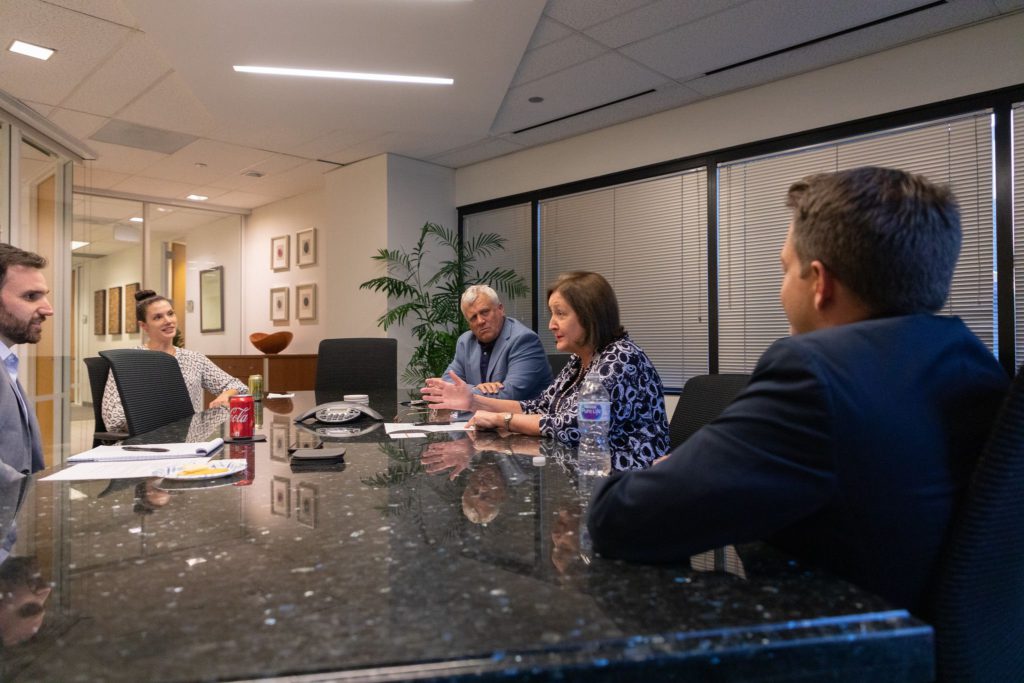
Participants were Suzanne Griffiths, managing partner and president of Griffiths Law; Kip Hunter, Denver office managing partner of Hall Estill; Justin Krieger, incoming managing partner of the Denver office of Kilpatrick Townsend & Stockton; and Kendra Snyder, a litigation associate at Hall Estill. Law Week Colorado managing editor Tony Flesor moderated the discussion.
LAW WEEK: Looking back on 2019, what have you each seen as a highlight that defined the legal world or legal business in the past 12 months?
KRIEGER: In the patent area, which is probably the limits of my knowledge, it has pretty much held steady. There was a high of patent litigation in roughly the 2013 timeframe, and it’s dropped off pretty steadily since then. We’re probably at 33% of where we were in 2013 now, but it looks like the dropping off has stabilized. It’s about the same this year as last year in terms of patent litigation.
In terms of business motivations, the technology is kind of changing from year to year, and the hot one right now is artificial intelligence. I think you can expect to see a lot more in the AI space as that technology continues to develop, and I think you’ll see that not only just in the next year but over the next five to 10 years.
GRIFFITHS: In family law, we’ve seen a boom of baby boomers. The divorce rate for 50-pluses has increased considerably. That means it’s higher in more-money cases, people with a lot of assets, and fewer parenting battles as a result, because they’re older. But there’s a lot of people over age 60 who are divorcing who were never divorcing before. Family law is alive and really, really busy. So we’ve certainly seen no decline. I assume in time to come that will change with the millennials. They don’t divorce as much, and they don’t marry as much.
As regards our civil practice, what we’ve seen is the boutique firms — and we consider ourselves a boutique civil litigation firm — are doing very well with a particular niche. It’s the small client who wouldn’t be accepted by a big firm because they’ve just not got enough money. There’s a big trend for the smaller client, the individual client, the individual homeowner, etc., to move toward the boutique firms.
We’re getting a lot of work from the internet. A lot of clients these days find their attorneys online. Online marketing has increased considerably. In the days that I remember, it was more about relational marketing. Now, everybody looks on the internet. They want to look at reviews for their attorneys. And they want to find their attorneys online.
HUNTER: We all have particular focus areas in practice, I think one of the intriguing trends in 2019 was counterintuitive. In the commercial practice, corporate practice, corporate development, corporate finance was very busy. There’s a lot of money being made on the stock markets. There’s a lot of excitement in classic investment architecture.
One of my fields of study and specialty is the [exploration and production] space. And that’s the counterintuitive piece, because that’s always been a place where investment of money has been heavily hydrated, and that has fallen off significantly over the last 24 months — but the last 12 months in particular — as investors sideline their money from oil and gas.
I think we’ve seen cycles over the past 30 years that come and go in fairly brief periods of time. This one has lasted now for a long period of time. Most of the drilling that is taking place is actually taking place in order to hold leases rather than because of the positive economics. You see a lot of consolidation from the majors picking up a lot of the minors who are either in bankruptcy or sitting completely on the sidelines because they can’t find money. We’ve watched this particular space in the commercial world really take a downturn while the rest of commerce seems to be thriving across multiple industries.
SNYDER: In terms of topics of litigation that I’ve noticed us picking up are related to hemp farms. It seems that there tend to be more disputes related to the growth, cultivation and processing of hemp, not only in Colorado but also outside of Colorado. We’re starting to see more disputes that actually go to litigation related to that issue.
LAW WEEK: And in that scenario, that regulation is changing and rules are changing all the time.
SNYDER: All the time. And in relation to the marijuana industry, they are changing the regulations in terms of outside investment.
Another trend that is predicted for 2020 [in that space] is a lot more acquisitions — outside investment firms coming in buying up recreational marijuana facilities. So that could be great for our business. We’ll see if that pans out, but there’s been some buzz surrounding what these loosening of investment regulations is going to mean for the Denver market and in Colorado in general.
LAW WEEK: And with that having a particular impact in our community, is there anything else that might have been relevant to Colorado the rest of you are seeing?
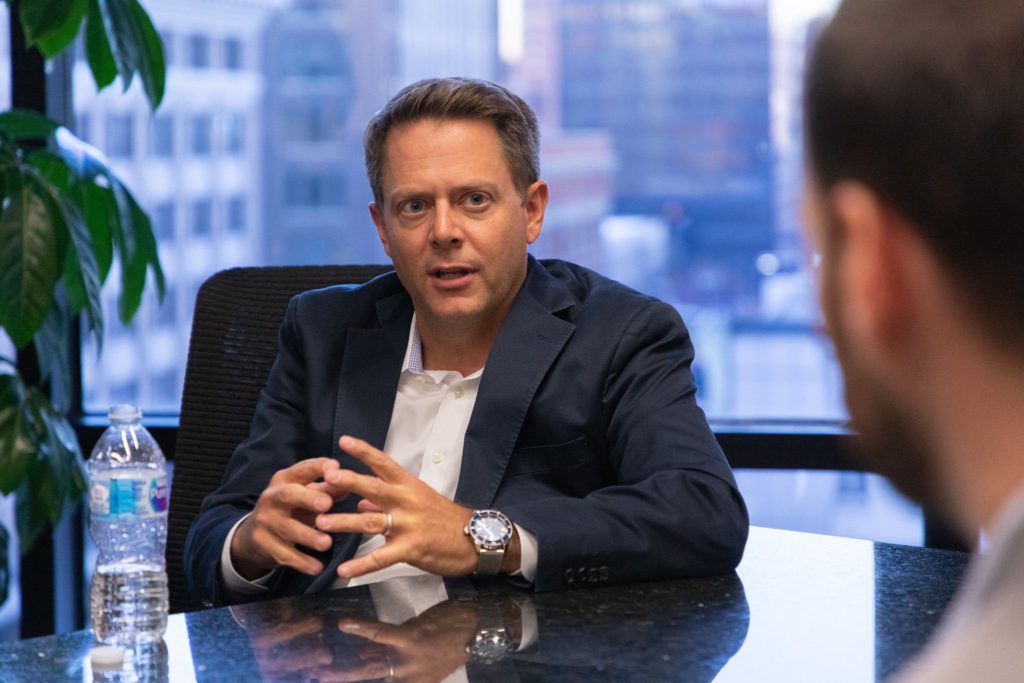
GRIFFITHS: I think marijuana has really driven the Colorado economy. We have a number of divorces and civil cases with marijuana businesses. And they’re fascinating cases. In the good old days, they didn’t have banking facilities, so to try to figure out anything was difficult. I don’t know whether maybe they make a lot of money and then they get divorced. People hire higher-end attorneys when there’s money to be to be divided, so I think there’s been a substantial increase in litigation since marijuana came to Colorado, and I think it has actually been extremely good for our economy.
HUNTER: It’s the single obvious industry in the country that is at a nascent state that is going to boom. That cow is so long out of the barn at this point that it will never be put back in. And it’s a very short period of time between now and when every state has it legalized. When it has the kind of interest that it does, particularly associated with health products and CBD products, and doesn’t have the dangerous reputation that tobacco has gained over time, I think you’re going to see a trillion-dollar industry on the back of that over the course of the next couple of years, and it will drive a lot of different aspects of our business.
Litigation Outlook
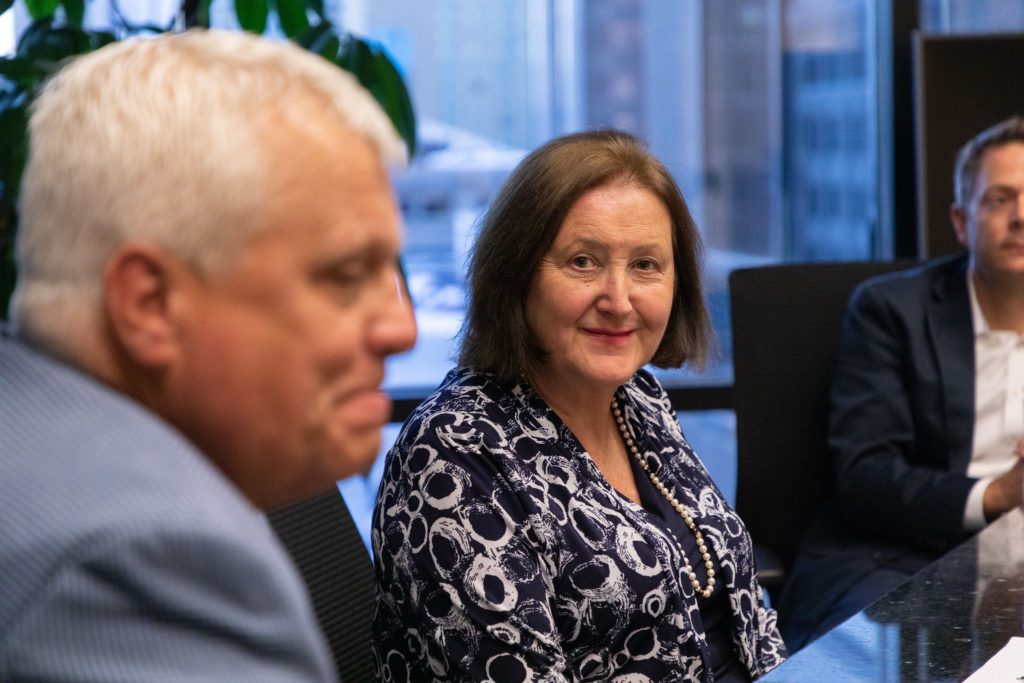
LAW WEEK: At the end of 2018, from what I heard in that roundtable discussion, a lot of the AmLaw 100 firms were gobbling up a lot of the litigation, and outside of that, many firms said they had been seeing a downturn in litigation. I’m curious if any of you have seen if that held through the year. Or alternatively, if because of your own specific niche that you’re in, that that might not be the case?
GRIFFITHS: I think a lot of the larger firms are consolidating the practices going national, and their high overheads. And as a result, you’ve got to have fairly wealthy clients or big corporations to hire them. That leaves the rest for the boutique firms. So actually, I think the larger firms are probably doing fine on transactional and other work, so they’re probably just fine.
The middle-of-the-road litigation is going to the smaller firms who can do it cheaper and more effectively at a much lower rate. They can offer lots of different options, contingency fees and fixed fees and flexible fees and things that the bigger firms can’t afford to do because they’ve got very high overheads.
KRIEGER: I think you’re seeing the specialization — what type of litigator you are — is a big factor where they’re going to hunt you out, regardless of whether you’re AmLaw 100 or what exactly it is that you’re doing.
I think that’s a factor in the patent space. Litigation, like I said, is pretty much holding steady now, but it is down pretty considerably from 2013. And I think that’s from top to bottom in terms of whether you’re AmLaw 100 or down to more the boutique space. An example is ITC litigation. So there’s patent litigation in the International Trade Commission, which is not a district court, but it’s a quasi-judicial governmental organization that you can bring an action to try and stop the illegal importation of counterfeit goods or goods that are infringing, your U.S. patent. This is one of those areas where it’s a very, very unique niche market. It’s the same for [inter partes review] and [post-grant review] practice. They’re going to find you, wherever you are, whatever firm you’re in, if you have a good track record in those areas.
HUNTER: Everything you’ve said, I agree with. We’re busy litigating cases. We see our litigators staying very busy, particularly in the energy space, and there’s a lot of lease conflict litigation that goes on. There’s a lot of bankruptcy these days because of the economic impacts that I was talking about earlier on. We see a lot of our large E&P clients using litigation in different strategic ways. It may not be all about the end goal, it may be about the process of litigation for strategic purposes in the moment, but our litigators are busy.
SNYDER: I work on litigation here, and like I mentioned, there’s a variety of new topics that are coming in. And I think another big piece of litigation that’s becoming more and more complex with technology is discovery and how to deal with it in an efficient manner and that doesn’t cost boatloads of money.
I’ve seen products being marketed to law firms about how to implement AI-type systems into your own technology system to better sift through these document dumps that you get in big litigation cases. You’re dealing with 100,000 documents instead of one person pumping through one page at a time. So I’ll be interested to see how that progresses and where that responsibility lies. Does the company themselves have to handle sifting through that and then pass it along to the firms or are the firms responsible for sifting through all that information? And I think that’s just going to play out as the technology develops.
GRIFFITHS: We’ve introduced programs that can do incredible searches and pick up a word in thousands of pages of documents. I think a lot of the big litigation firms use it. It can be expensive to get a subscription, but you can find any word any way in a PDF, document, etc. And that is the way of the future, try to wade through pages. You don’t find stuff the same way.
LAW WEEK: Is there anything that any of you have seen in terms of changing client expectations? Has anything changed for you in the type of service they’re expecting or the type of fees that they’re expecting to see?
KRIEGER: Patent litigation is down, so in the litigation that does occur, they’re very budget conscious. And they’re going to watch you — as they should — every step along the way to make sure that we provided estimates and that we’re meeting our estimates, and they’re going to hold you to those estimates. So you need to make sure that you do have sophisticated internal accounting and experience and mechanisms to make realistic expectations and estimates in terms of where you’re going to be throughout any given litigation.
You’re also seeing, more and more, that clients want to see law firms with some skin in the game. They like that for multiple reasons. Obviously, it gets you motivated. I’m not referring specifically to a contingency-type arrangement, although that does even happen in some cases, but just something to show that you care and that you’re really dedicated to them and their success in the litigation.
GRIFFITHS: We offer contingency fee cases in construction defect civil litigation in certain cases, and clients like it. There are some people who simply do not have the funding to run a case any other way, so it’s certainly attractive. You can’t do it in divorce cases, so that’s not an option.
Most clients these days are pretty savvy. They will come into the office, they’ve read the internet, they’ve researched the kind of advice you’re going to give them and they are really pretty knowledgeable. And clients are cost conscious. In certain cases — certainly in some divorce cases — some clients don’t care what they spend, it’s just so emotional they’re just buried in the fight, but most clients are cost conscious, and I don’t blame them. Litigation is really expensive.
HUNTER: We don’t do much beyond straight hourly fee billing. There is a contingency committee in the firm, and if you have a contingency opportunity, it’s examined pretty carefully. We had one become very good for the firm in the last fiscal year, but I haven’t seen any taken on recently. You have to be competitive in your pricing, you have to be ready to be sensitive to your clients’ abilities to pay if you want the work. It’s a balance that has to be struck. It’s relatively easy to talk about the fee expectations at the front end of a matter, but it’s relatively difficult to collect that last bill oftentimes because they don’t want to pay it.
And to your point, the clients very much want to hear what you anticipate the thing is going to cost, which is a fraught task. It’s difficult. It can put you in a bad position at the end if it turns out that something is costing more. You have to keep them advised of that all the way along and make sure that you condition your estimate pretty heavily.
We compete in the Denver market, in part because we bill, essentially, Tulsa rates, which are lower by a fair percentage than firms that we consider to be our peer firms in terms of rates and size and scope. We do use that as a marketing tool that we can we have the same bench strength but can provide it at a at a lower rate on an overall project.
GRIFFITHS: We generally ask for retainers. I think if clients owe you a huge balance, it becomes your cause and it always needs to be the client’s cause.
2020 Vision
LAW WEEK: Moving into the more forward-looking topics for 2020, is there anything that you are looking at on the horizon that looks to be a major change?
KRIEGER: I think the one thing that been a pretty significant change in patent litigation is this TC Hartland decision that the U.S. Supreme Court delivered in 2017. Prior to that case, you could file a patent lawsuit anywhere where somebody sold the product. Basically, it’s huge forum shopping. And as a result, the Eastern District of Texas was where players started to receive very favorable judgments, so all of them flocked to the Eastern District of Texas. But now the Supreme Court said that where a company resides under the statute for venue is where they’re incorporated. So all this forum shopping based on where they sold products was effectively dead. So now, for the first time only recently, the district of Delaware, not surprisingly, has overtaken the Eastern District of Texas for patent infringement litigation.
I think in the coming year, you can see a lot more of that, where people are looking to what other jurisdictions are favorable, other than the Eastern District of Texas where you might not be able to establish venue, and undertaking a lot more research and seeing which of those district courts are the ones that are going to step to the forefront in terms of representing plaintiffs in patent litigation.
GRIFFITHS: I have always held the view that one of the single biggest challenges for the legal profession is the retirement of the baby boomers. If you look at the numbers, they are massive numbers of partners. If you look at all the BigLaw firms, people in the driving seat, many of them are in their sixties. So you suddenly have a very large group of baby boomers retiring.
Our focus is going to be on training the younger attorneys further down the ladder so that they can take over management positions and run firms. I think a lot of the big firms have got committees that are focusing on that, to bring millennials and the mid-level attorneys up. As much as the boomers are apparently loath to give up the reins, I think the number that they’re going to retire every single day, in the next 10 years is mind boggling. So the dynamic of law firms is going to change considerably.
I work with a number of younger partners, and they think differently in many respects. They do everything with a load of technology. They’ll never use a dictating machine or the old system, so you find the firms are going to be run by younger people who are going to use a lot of artificial intelligence, technology and online marketing. So there’s going to be a shift to more remote working, because you’ve got fabulous technology for that.
A year or two ago, we didn’t. Everybody had a desktop. Now, every single person in the office has a laptop, so we can have a snow day and everybody’s fine. Pick up your laptop, go home and work remotely. We actually ran a calculation as to what does the productivity look like if everybody was working remotely as opposed to within the office, and it wasn’t much different.
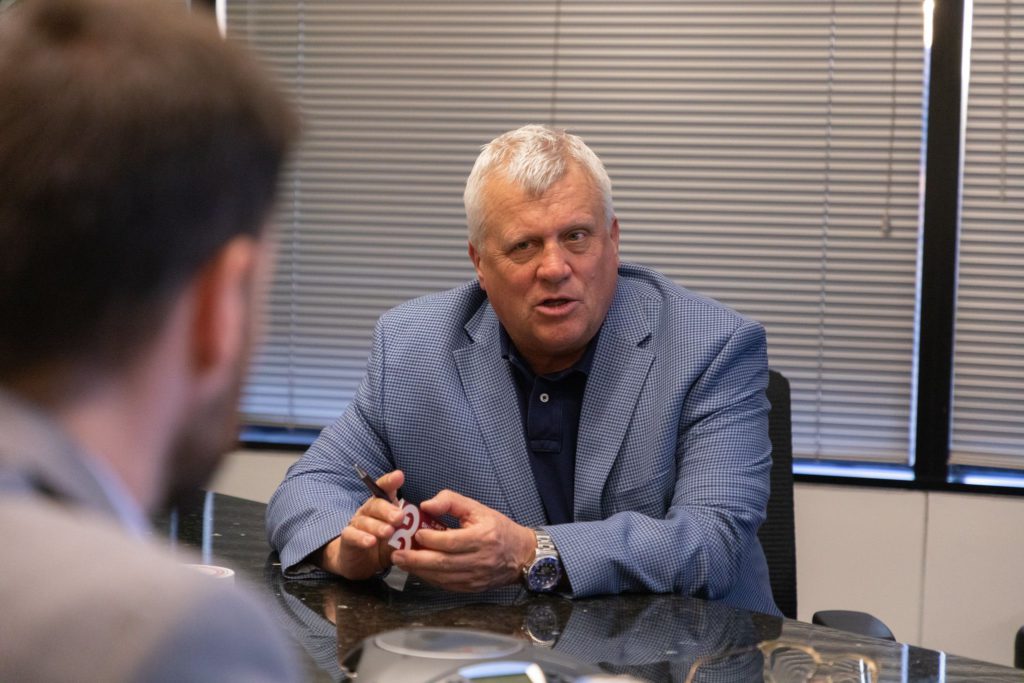
I think you’re going to see more people working on flexible schedules, more clients expecting to be on the phone and not having to drive to offices downtown all the time. A lot of this stuff is done in a more remote environment.
KRIEGER: This is a hot topic right now, and it’s something that people have strong opinions over. And you’re never going to get agreement on it, but the bottom line is the millennials and [the firms] need the incoming talent. [Millennials] expect some more flexibility than in the past. And if you want that top-tier talent, whether it’s attorneys or staff, you have to start offering these sorts of things, at least to some extent, in order to meet what other law firms are doing. It’s one of those things where these are the times we live in, and they’re changing.
HUNTER: We see exactly these trends. Our firm, firmwide, is a pyramid of the wrong shape. By which I mean the wide portion of it is made up of, frankly, mostly white men who look like me a little bit.
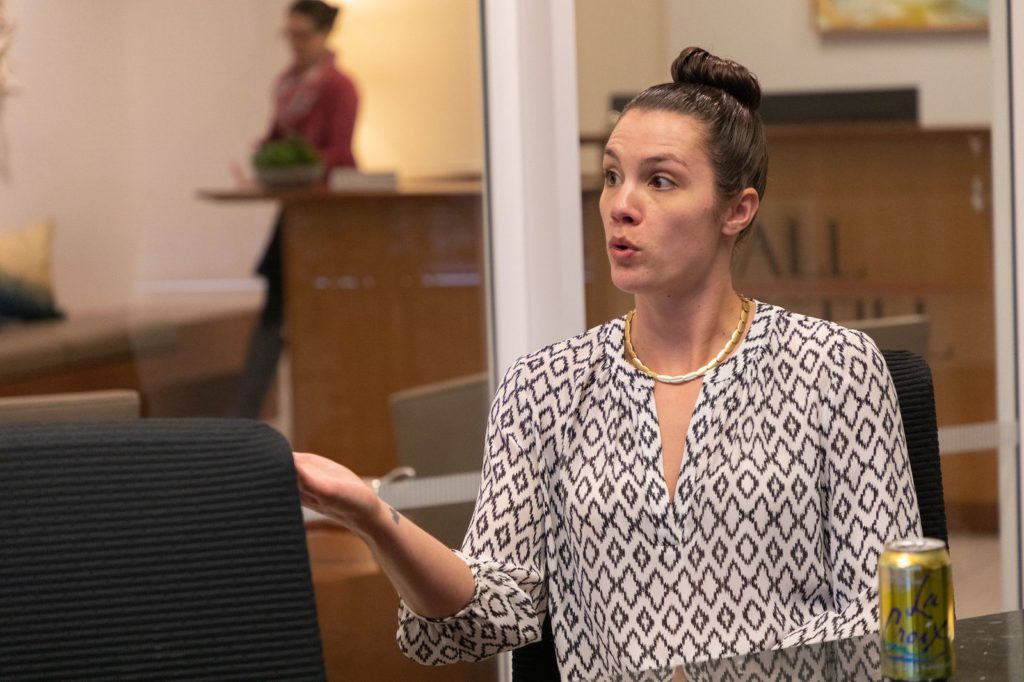
GRIFFITHS: Baby boomers.
HUNTER: And that won’t work in a very short period of time. You have to diversify across the entire spectrum. You have to do it with a great deal of proactive intention. You have to be nimble in terms of value.
Offer your staff, and in particular the young talent, these opportunities. They still draw talent because the model financially has worked for a long period of time. If you succeed in a firm with this particular financial model, you’re going to, over the course of a career, have made a lot of money. But that attitude no longer is entirely enough to attract the best talent. They want creativity and they want to deliver the product in new ways, and they want to do it with a new energy, which is entirely appropriate. The change will happen whether you want it to or not. Whether you have deep objections to people working remotely, they’re going to work remotely. And the sooner that my generation accepts it and celebrates it and facilitates it, the more successful that succession will be, which is again going to happen just as the clock turns.
While firmwide, where that wrong picture is, where the youth is less than the older folks, we aren’t that way here in Denver, and that’s been done with a purpose. We’ve looked very hard to be diverse in how we hire, and we hire with a purpose to have more youth and only one of us that looks this way.
So generationally, the firm saw that and said this is how we want to build this office. And it’s worked so far. And if you keep that — that model and that balance — it should work over a long period of time, that you constantly bring in the young people into the fore.
GRIFFITHS: The big trend, I think is going to be more women. And they’re going to want to work remotely, they’re going to want to have parental leave policies. I think if you look at the statistics, you’ll see that a large number of women have quit. They go to university, they get a law degree and then somewhere around the age of 40, 42, they quit and you lose their talent.
The way to keep that talent is with a really good parental leave policy. They have their kids, they’re given opportunity for a flexible schedule, and you get fabulous talent. You need to keep more women in the legal profession because there are really good ones. And it’s a pity if you lose those talents.
I’ve had to adjust. The younger ones have made me adjust. They think I’m old fashioned, and they forced me to change.
SNYDER: I do think that there is absolutely an expectation that firms are more accommodating. This idea of the super formal, stiff, big firm is not very appealing, even though they might pay well. When you’re looking at jobs, yes, obviously money matters because we have these huge loans that we have to pay off, but the work environment, the office culture, being able to work from home and not having to wear a three piece suit every day — that type of stuff really does add a benefit. Being able to enjoy where you go to work and feel like there is some level of flexibility, I think is a huge added benefit and definitely is an incentive to get younger attorneys to want to work at that firm. I will also say that I think that we are all looking forward to the baby boomers all retiring. we’re ready to take over. And we’re not afraid of that, we are ready to take it on.
GRIFFITHS: The more they work, the more we can vacation.
Keeping Up on Diversity
LAW WEEK: You’re all mentioning the diversity topic. That’s something that continues to be a really big conversation point with law firms of all sizes. To me, looking back at 2019, it seems like that there’s been more conversation saying that change needs to happen quicker.
HUNTER: It’s really hard. I do most of the recruiting here in Denver and help firmwide. The law school populations aren’t supporting a really aggressive approach to diversify law firm populations. There is an increase in women, for certain, but it is difficult to recruit and find people of color, as an example. It’s very difficult. If you look at law school populations, you’ll know why there aren’t many [attorneys]. I don’t know why the profession doesn’t attract a more diverse law school population, but until that happens, it’ll be tough to get that diversity really integrated into law firms. You find a lot of female attorneys, and it’s increasing and increasing, which is great. But I have, with a will, tried to recruit other diversity. It’s hard to find.
SNYDER: I can tell you the law schools do try. They try very hard, and they incentivize. They have specific diversity grants and scholarships, and when I was in law school, this topic would be brought up, and the people of color in our law class would say it was difficult to make the decision to come here knowing I was coming to Colorado and I was going to be one of five black students in the law school class.
I think that’s a statewide issue, that we already have a very white state. There’s a large Hispanic community out here, but they’re certainly not represented in the graduate level classes. And I think part of that is the exorbitant amount of money that it costs to go to law school. In this day and age, you’re taking out over six figures, easy, in loans. And looking at that and not being in a position where you came from a socioeconomic status of being willing to take on that level of debt and feel comfortable that you’ll pay it off, or, if not, maybe your parents will help or you’ll have some other type of assistance. I think that is just a wider national problem in general of how excessive college and graduate schools are becoming and their tuition rates and that [law school] is becoming an elite program, because most people can’t spend $80,000 a year to go to school.
I can also say since I’ve graduated law school relatively recently, the income trends don’t match what they expect you to take out in law school loans. They really don’t. And law schools are continuing to increase their class size every year because they want to make as much money as possible. And they want to get tuition for as many kids as possible. There’s a surplus of lawyers because every year they’re increasing their class sizes. And now you graduate law school and you’re starting at 50 grand a year. And that does not pay for your loans. And so the actual high paying legal jobs are becoming fewer and fewer.
I remember I’d have a lot of discussions with a previous boss, and he would always say I can throw a rock and hit 10 attorneys, why am I going to pay a newer attorney more when I can find someone else and pay them less? I think that is another problem that’s going to have to be addressed eventually because I think, hopefully, either the schools are going to do something about it or I think eventually over the next few years, people are going to realize it doesn’t pay as well as we’ve been promised.
HUNTER: At larger firms, the competition is fierce for talent and those firms pay and so the difference between the haves and the have nots in that regard is probably pretty extreme.
SNYDER: There’s a difference between my peers that graduated the same time and have the same level of experience in terms of years. The gap of what some of my friends make versus what some of my other friends make. It’s not like they went and became public defenders, they’re still working for private firms. It’s significant. I mean, like a $100,000 gap.
Quick Predictions
LAW WEEK: To close the conversation, I want to ask for predictions for 2020. What are your one-sentence answers predictions for what will have the biggest impact on the law in 2020?
KRIEGER: In one sentence?
LAW WEEK: That’s the challenge. We talked about the impact of technology and artificial intelligence, we talked about diversity, and litigation. We did not talk about whether an economic dip is coming around the corner.
KRIEGER: This isn’t going to make a whole lot of sense to people outside the patent field, but I think you’re going to see a significant increase in filing of inter partes review and post grant reviews and challenging people’s patents.
GRIFFITHS: I would say the economy is a huge driver of what happens in the legal practice. If we continue with the great stock market, great real estate market, I think things are going to be good and firms are going to be busy, and it’s going to be lots of money and lots of work. If we have an economic downturn, I think you can see what we saw in 2008 with real estate firms not hiring and laying off. But hopefully not.
HUNTER: The national election cycle.
KRIEGER: That wasn’t even a sentence.
SNYDER: As Suzanne mentioned, the digital marketing and the culture of the Yelp review is going to continue to drive new business, and how firms market themselves is getting those reviews up as high as possible.
LAW WEEK: O.K., so I’ll ask one follow up. On the election cycle, do you have an if-this-then-that? What do you think is going to be the major impact on the legal business?
HUNTER: No, I don’t think there’s a predictive path. I just know it’s going to be impactful, and it will be impactful across the stock markets and across the entire economy, and the political matters that are in play now and that will play out over 2020 will drive our business in a variety of ways.
GRIFFITHS: Tax changes always make a big difference right now with companies had such a fabulous tax reduction and they’re flush with money.
KRIEGER: And research with drugs and pharmaceuticals and all the concern for increasing prices for pharmaceuticals.
It’s a big catch line in what we’re hearing already with the debates. But that plays a huge role in patents as well. If you’re going to patent those drugs and you’re going to research those drugs, how much you’re going to spend on research, first of all, how many patents you’re going to get far enough to actually file for patent protection, and then if you do, how far are you going to be able to get with them? If all that is really worth it? If at the end of the day, you’re not going to be able to sell the drugs at the historically high price for pharmaceuticals?



